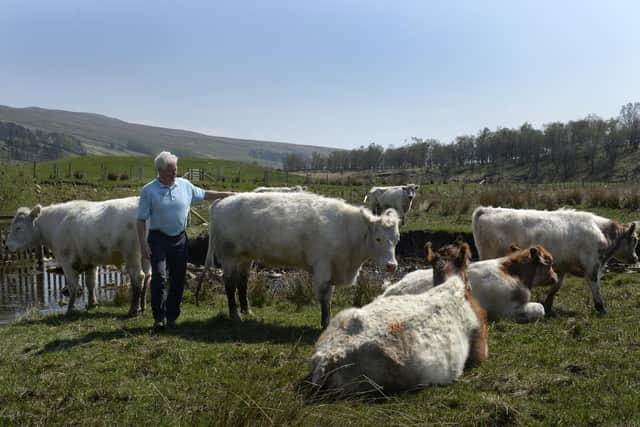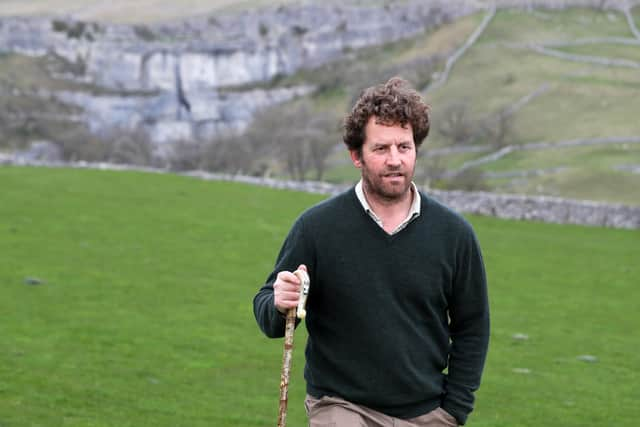The business model farmers have been using for decades doesn't work, says North Yorkshire rural commissioner Chris Clark
"The key is that farming is in trouble," he tells The Yorkshire Post. "It doesn't matter whether it's arable or upland or mixed livestock. We're in trouble. And the reason that we're in trouble is that we've got things wrong through our leadership, the leadership of the agricultural industry."
Mr Clark admits the conclusions published this week by the Rural Commission, advocating a shift away from the business model that has dominated in agriculture for the last six decades, are likely to be controversial.
Advertisement
Hide AdAdvertisement
Hide AdBut the partner of Nethergill Associates, a business management consultancy involved in farm management, insists: "What we're looking at is trying to get some help for farmers.
"In my view and in the Commission's view, it is not the fault of the farmer, per se, they have been led down the route that they now find themselves in the position that they now find themselves in."
The report says the problems facing the industry reflect the shortcomings of a subsidised industry, "which has often enabled inefficient farming practices to continue and made it even harder for progressive farming practice to develop".
Many good farners, it says, are weighed down by the burden of their fixed costs, do not fully understand the farming business process and need help in order to develop sustainable and profitable farms.


Advertisement
Hide AdAdvertisement
Hide AdTo escape this trap a change in mindset is needed, with industry leaders encouraging farm businesses to concentrate on increasing profit margins rather than intensifying practices to simply produce more.
And with support under the current regime of government subsidies for farmers due to run out in the next few years, the former manager of nearly 400 acres of land at Nethergill Farm at Oughtershaw, near Skipton, says time is running out for changes to be made.
Mr Clark says "At a farm, you are in business, and that is what should be driving the business, and the new evidence that is coming out now has found that that the business model that we've been using for the last 40, 50, 60 years, does not work in farming.
"So that model says that at some volume a farm business will break even, if they try and drive production which is what I was taught at agricultural college, and increased levels of output at some point, a profit will be made.


Advertisement
Hide AdAdvertisement
Hide Ad"Unfortunately, that doesn't work in farming, and we've been let down by the agricultural leaders because they haven't understood that the business model that has been encouraged doesn't actually work."
The Rural Commission says the Department of Environment, Farming and Rural Affairs (Defra) must have a more integrated approach to farming, land management and the environment.
It says: "It must recognise that farming and land management practices are central to achieving environmental targets. Working with Nature, rather than substituting for it, will deliver the most profitable farms in conjunction with the most sustainable Nature."
With this in mind, it recommends that North Yorkshire County Council, in conjunction with the Yorkshire Agricultural Society, should set up a new Farm Business Task Force to direct the culture change needed for the farming future and to ensure changed business practice meets environmental targets.
Advertisement
Hide AdAdvertisement
Hide AdAnd it says that Defra must provide free business coaching and mentoring support to help farm businesses survive and restructure, whilst ensuring support is in place to help farmers exit the industry with dignity.
"All the agricultural subscription organisations, the NFU, the CLA, the Tenant Farmers Association, all these organisations will have to understand and accept that working with nature rather than substituting for it will make the industry, and the individual farms within that industry better off.
"There is a sweet spot. And that sweet spot is where nature and the farm business coincide. And where that joining up happens, occurs, nature is at its best, and farming is at its most profitable.
"We live in a managed landscape, nature and farming are in equilibrium, or were in equilibrium until we started trying to drive production, and we need to get back to that equilibrium where nature and farming coincide and it mutually benefits them both.
Advertisement
Hide AdAdvertisement
Hide AdThe Rural Commission says business mentoring must be targeted at the farm family rather than a ‘farmer’ to achieve culture change.
And Mr Clark says: "One of the other things that's been found out is that the drivers for change in a family farming business is quite often the spouse or partner. It is quite often the woman who drives the change.
"I've been in situations where I'm on the farm, around the kitchen table, and the farm business might be bringing in £40,000 of support, and yet they're still not making any money and the only way these farm businesses are surviving is through the spouse's income, the partner's income.
"She may be a nurse or a teacher or working in Sainsbury's or wherever it is, but a substantial portion of her income is going to support a farm business and that's the only way they can keep going. Now that is less of a case in the lowland farms, the arable farms but in the upland farms, they are much, much more vulnerable."
'We're now on the cusp of tackling farming's big issues'
Advertisement
Hide AdAdvertisement
Hide AdNeil Heseltine who chairs the Yorkshire Dales National Park Authority as well as running Hill Top Farm in Malham, says the farming sector is "on the cusp" of being able to tackle the problems that have blighted it for decades.
In his evidence to the North Yorkshire Rural Commission given in 2019, Mr Heseltine described the social aspects of agriculture and admits the picture he painted is "not particularly rosy".
He cited the high accidental deaths rates, including the fact that farming is the only industry where children still die in the workplace, as well as the poor mental health suffered by many who work on farms.
"And what I was saying in the commission is that we have to be honest about those figures at the outset before we can move on and address them," he tells The Yorkshire Post.
Advertisement
Hide AdAdvertisement
Hide Ad"I'm not always sure that as an industry and particularly some of the leaders in our industry are necessarily that honest about the figures, they try to paint a rosier picture than what we're actually in. And I understand why they would do that.
"I'm a big believer that in any sort of process of improvement, you've got to be brutally honest and brutally objective with where you're at the outset to understand where you want to get to and set yourself targets and then you've got to find out ways to move from one to the other."
A key to improving all this, he says, is changing the way farmers produce food and fundamentally how farming is carried out so it has a much greater focus on climate change.
The UK's departure from the European Union and the Government's post-Brexit plans for agriculture mean farmers will now be rewarded for managing their land in an environmentally sustainable way.
Advertisement
Hide AdAdvertisement
Hide AdMore details of this emerged last week, as Environment Secretary George Eustice said farmers will be able to earn up to £70 per hectare for actions to improve the health of their soil.
The Government says its Agricultural Transition Plan, which outlines the roadmap towards introducing a renewed agricultural system now the UK is free from the Common Agricultural Policy, will be tailored in the interests of English farmers.
Mr Heseltine said he and other farmers would be looking very closely at the different schemes coming out of government to work out how their businesses can best take advantage of them.
He said: "And so starting from a fairly negative perspective at the outset I just think we're on the cusp or the precipice of something really, really positive but to arrive there, it's not a change in mindsets, it's a shift in mindset in how we produce that food so it's all embracing of climate and the nature recovery.
Advertisement
Hide AdAdvertisement
Hide Ad"There are methods of farming out there where there's evidence to suggest that that sort of multiple win situation is possible, there's much more evidence out there that there are farming techniques that can deliver for nature, deliver for the environment, and can deliver for the people doing it as well as for producing food."
